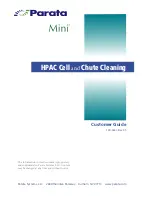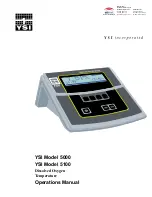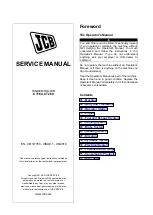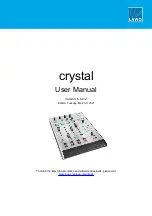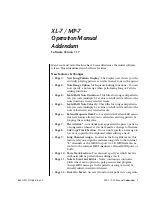
Annual Inspection
WARNING! Regularly conduct periodic examinations.
User safety depends upon the continued efficiency and
durability of the product. The periodic examination frequency
shall be at least every 12 months by a competent person,
and in accordance with the manufacturer’s periodic
examination procedures.
The MultiAscend must be inspected thoroughly at least once every 12
months to ensure the safety of the device which is dependent on the
continued function. Annual or periodic exams must be completed by
competent persons according to the manufacturer’s instructions. Follow the
pre‑use inspection guide described above. Record the service.
Fig. 16
gives an example of the Equipment Record and Inspection Log, which must
be kept for the MultiAscend.
Note: It is the user or user organization’s responsibility to fill out the
equipment record.
WARNING! The periodic examination frequency shall
be at least every 12 months. Determine if more frequent
examinations are required based on applicable regulatory
requirements, equipment type, frequency of use, and
environmental conditions.
Lifespan
• The maximum lifespan of the top
adjustment strap is five years
from the date of manufacture.
However, this can be
considerably shorter depending
on the usage intensity and
environment in which it is used.
• The main metal body has an
unlimited lifespan based upon
passing inspection before
each use.
WARNING! Only a competent person should conduct the
periodic examination, and the examination should be strictly
in accordance with the manufacturer’s periodic examination
recommendations.
Maintenance
• If soiled, rinse in clean warm
water (maximum temperature
25°C [77°F]) with non‑detergent
at appropriate dilution (Ph range
5.5–8.5), thoroughly rinse.
• When the equipment becomes
wet, either from being in use
or when due to cleaning, dry
naturally, and keep it away from
direct heat.
• Light surface corrosion may be
removed with a wire brush (no
power tools). Retire if corrosion
is heavy.
• Spare components can be
purchased for the top adjustment
strap (IN910) and the bottom
saddle bracket (IN909).
• Repairs to these parts should
only be performed by a
competent person or at a Harken
service center.
Lubrication
• Lubricate the cam
axle with a
silicone based lubricant or dry
graphite. This should be carried
out after cleaning and drying.
Ensure that all excess lubricant is
removed before installing rope.
• If any pivoting elements are
sticky or do not have full range of
motion, cleaning and lubrication
may solve the problem. If they
do not, replace the product
immediately.
Packaging, storage, and transportation
• Keep dry, away from solvents
and corrosive materials.
• Do not store at extreme
temperatures or with direct
exposure to UV.
• To prevent damage, ensure
swing plate is closed during
storage and transportation.
Warranty
Harken guarantees this product for three years against any defects in
materials or manufacture. The guarantee does not cover this product from
normal wear and tear, oxidation, modification or alternation, incorrect use or
storage, poor maintenance, accidental damage, negligence or any usage for
which the product was not designed.
EU Type-Examination Certificate
Please visit www.harken.com
Selecting other components for the system
Verify that this product is compatible with the other elements of the system
in your application. Equipment used with the Ninja MultiAscend must meet
the current standard in your country. Do not use with any equipment that
could impede the safe function of the MultiAscend, dangers could arise if the
function of the MultiAscend is compromised.
Note: Use this device only in conjunction with CE‑marked PPE.
Characteristics for the anchor
• Anchor ropes should be attached
to the anchor points above the
user. Avoid slack in the anchor
rope between the anchor point
and the user.
• Rope must run straight or
directly through the device and
not deviate.
Fig 6
• When used in a haul system, the
MultiAscend must be allowed to
align with the load.
• Anchor must meet requirements
of EN 795 standard,
12kN minimum strength or
meet the current standard in
your country.
• When used as a chest ascent
device and the rope is not
vertical, the user must keep the
tail of the working rope between
their legs to ensure proper
loading of the device.
Pre-use inspection
Inspect the MultiAscend prior to each use to ensure that the MultiAscend is in
serviceable condition and operates correctly. Use the following list as a guide
to determine its operability:
• Ensure that the latch moves
freely, has spring pressure and
locks with an audible click. Verify
that the swing plate cannot
be rotated open by pulling up
on plate.
• Ensure that the pawls move
freely by rotating the pawl
triggers and that the pawl springs
readily return the pawls to their
closed position.
• Ensure that there is not
excessive wear on pawl teeth
that could affect function. Do not
alter the pawl teeth in any way.
• Ensure that cap screw runs
through both legs of body,
locknut is in place, and cotter
ring is in cap screw.
• Ensure that cap screw and the
bottom saddle bracket have
no deformation, wear, and/
or corrosion.
Installation on rope for progress capture/ascent
1. Open swing plate by rotating
latch and rotating swing
plate.
Fig 7
2. Separate the pawls and install
the rope.
Fig 8
3. Close swing plate and ensure
that you hear a click as swing
plate latches. Ensure that it
cannot open by pulling upward
on the bottom of the plate.
Fig 9,
Fig 10
4. While climbing, check progress
capture during ascent.
Down-climbing operation
1. Remove weight from
MultiAscend.
2. Lift up on each pawl trigger.
3. Gently lower to new weighted
position on the rope.
4. Release pawl triggers to
reengage MultiAscend by
weighting device.
WARNING: Do not shock load pawls as you down climb.
When used in a haul system:
The MultiAscend can be used in a haul
system, where the MultiAscend will clamp on the rope in one direction and
move freely in the other. The MultiAscend can be connected directly into the
system with the bottom saddle bracket, with a carabiner, or with a lanyard up
to 1 m long. The arrow on the MultiAscend should be in line with the vector
being lifted.
Rescue plan:
You must have a rescue plan and the means to rapidly
implement it in case of difficulties encountered while using this equipment.
Operating temperature:
‑30°C and +50°C (‑22°F and 122°F)
Note: Suitable conditions of use: wet and oily conditions; not intended for use
under dusty conditions.
Removing from service
If the MultiAscend has been subjected to the forces of arresting a fall it must
be immediately withdrawn from use. Product can be severly damaged if
exposed to chemical agents, heat, abrasion, or a drop that results in visible
damage or loss of function. It should be removed from service if safe function
is in doubt. If in doubt check with Harken. Once removed from service do not
use the device again until it has been confirmed in writing by a competent
person that it is acceptable to do so.
Do not use if the product has become severely damaged by contact
with chemical reagents. Immediately withdraw the device if it cannot
function safely.
Fig 11
Fig 12
Fig 13
Fig 15
Fig 16
Annual Inspection
Date
Reason for entry
(Periodic exam or
usage)
Defect notes and
other important
information
Name and
signature of
competent
person
Date of next
periodic
examination
Fig 17
Fig 7
Fig 8
Fig 9
Fig 10
“Click”
Fig 6
Equipment Record
Product:
Model/Type
IN403
Description
Ninja MultiAscend
Serial Number
Manufacturer
Harken
Address
N15W24983 Bluemound Rd
Pewaukee, WI 53072‑4974 USA
Tel/Website
+ 1 262‑691‑3320
www.harken.com
Year of manufacture
Purchase date
Date first put into use





